
https://ebookmass.com/product/pragmatist-egalitarianismdavid-rondel/
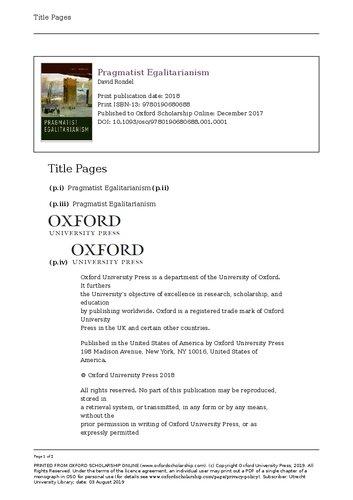
Instant digital products (PDF, ePub, MOBI) ready for you
Download now and discover formats that fit your needs...
Pragmatist Semantics: A Use-Based Approach to Linguistic Representation Prof José L. Zalabardo
https://ebookmass.com/product/pragmatist-semantics-a-use-basedapproach-to-linguistic-representation-prof-jose-l-zalabardo/
ebookmass.com
Three Scoops: Stories by David Hill David Hill
https://ebookmass.com/product/three-scoops-stories-by-david-hilldavid-hill/
ebookmass.com
King David, Innocent Blood, and Bloodguilt David J. Shepherd
https://ebookmass.com/product/king-david-innocent-blood-andbloodguilt-david-j-shepherd-2/
ebookmass.com
Life Cycle Sustainability Assessment for Decision-Making: Methodologies and Case Studies 1st Edition Jingzheng Ren
(Editor)
https://ebookmass.com/product/life-cycle-sustainability-assessmentfor-decision-making-methodologies-and-case-studies-1st-editionjingzheng-ren-editor/ ebookmass.com
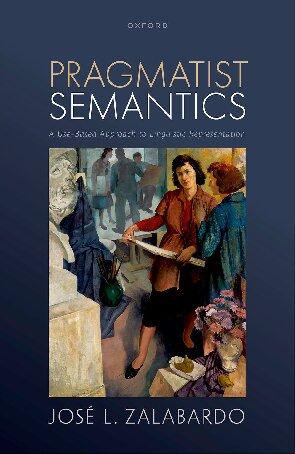


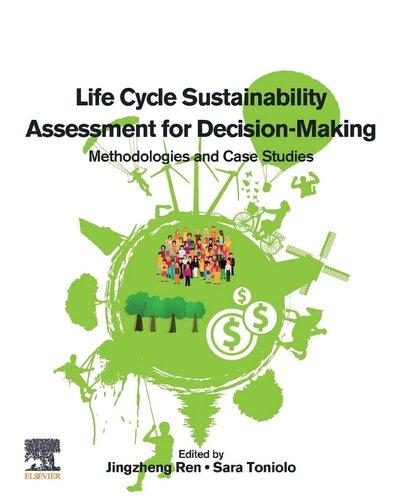
Masso-kinesitherapie et therapie manuelle pratiques 3rd Edition Michel Dufour
https://ebookmass.com/product/masso-kinesitherapie-et-therapiemanuelle-pratiques-3rd-edition-michel-dufour/
ebookmass.com
The Economics of the Super Bowl: Players, Performers, and Cities 1st ed. Edition Yvan J. Kelly
https://ebookmass.com/product/the-economics-of-the-super-bowl-playersperformers-and-cities-1st-ed-edition-yvan-j-kelly/
ebookmass.com
Marketing 6th Edition Dhruv Grewal
https://ebookmass.com/product/marketing-6th-edition-dhruv-grewal/
ebookmass.com
Linear Algebra and Group Theory for Physicists and Engineers 2nd Edition Yair Shapira
https://ebookmass.com/product/linear-algebra-and-group-theory-forphysicists-and-engineers-2nd-edition-yair-shapira/
ebookmass.com
John Rawls and Environmental Justice John Töns

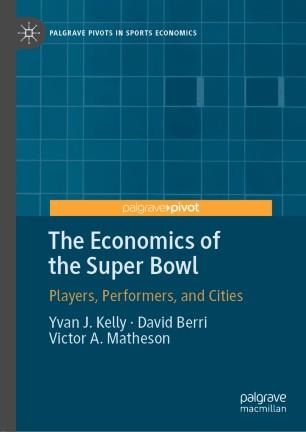


https://ebookmass.com/product/john-rawls-and-environmental-justicejohn-tons/
ebookmass.com
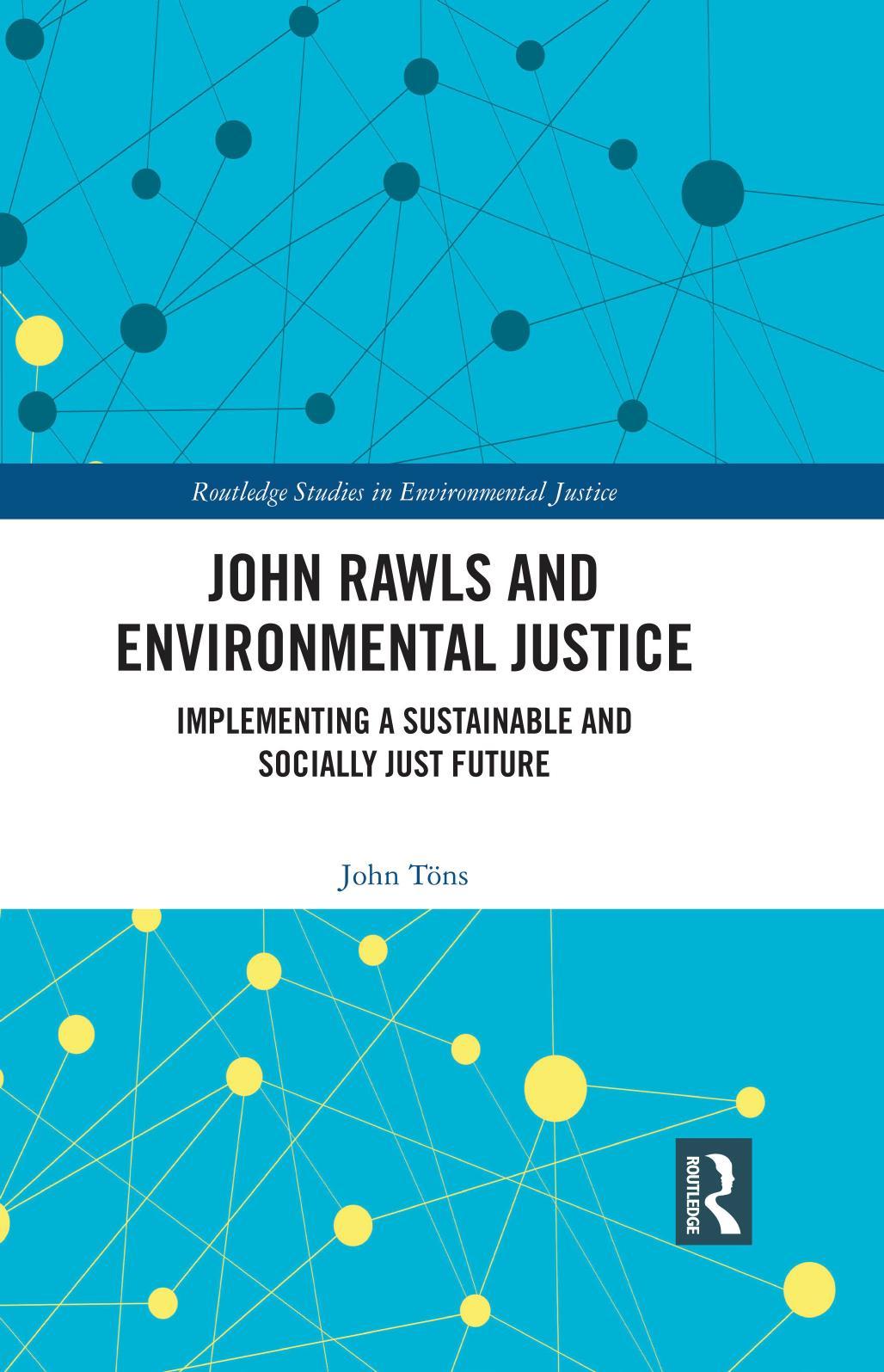
https://ebookmass.com/product/health-assessment-in-nursing-sixthnorth-american-edition-ebook-pdf-version/
ebookmass.com


Pragmatist Egalitarianism
David Rondel
Print publication date: 2018
Print ISBN-13: 9780190680688
Published to Oxford Scholarship Online: December 2017 DOI: 10.1093/oso/9780190680688.001.0001
Title Pages
(p.i) Pragmatist Egalitarianism (p.ii)
(p.iii) Pragmatist Egalitarianism

(p.iv)

Oxford University Press is a department of the University of Oxford. It furthers the University’s objective of excellence in research, scholarship, and education by publishing worldwide. Oxford is a registered trade mark of Oxford University Press in the UK and certain other countries.
Published in the United States of America by Oxford University Press 198 Madison Avenue, New York, NY 10016, United States of America.
© Oxford University Press 2018
All rights reserved. No part of this publication may be reproduced, stored in a retrieval system, or transmitted, in any form or by any means, without the prior permission in writing of Oxford University Press, or as expressly permitted
Page 1 of 2
PRINTED FROM OXFORD SCHOLARSHIP ONLINE (www.oxfordscholarship.com). (c) Copyright Oxford University Press, 2019. All Rights Reserved. Under the terms of the licence agreement, an individual user may print out a PDF of a single chapter of a monograph in OSO for personal use (for details see www.oxfordscholarship.com/page/privacy-policy). Subscriber: Utrecht University Library; date: 03 August 2019
by law, by license, or under terms agreed with the appropriate reproduction rights organization. Inquiries concerning reproduction outside the scope of the above should be sent to the Rights Department, Oxford University Press, at the address above.
You must not circulate this work in any other form and you must impose this same condition on any acquirer.
Library of Congress Cataloging-in-Publication Data
Names: Rondel, David, 1978– author.
Title: Pragmatist egalitarianism / David Rondel.
Description: New York : Oxford University Press, 2018. | Includes bibliographical references and index.
Identifiers: LCCN 2017016897 (print) | LCCN 2017043623 (ebook) | ISBN 9780190680695 (updf) | ISBN 9780190680701 (epub) | ISBN 9780190680718 (online course) | ISBN 9780190680688 (cloth : alk. paper)
Subjects: LCSH: Equality—United States—History. | Pragmatism— History.
Classification: LCC JC575 (ebook) | LCC JC575 .R563 2018 (print) | DDC 320.01/1—dc23
LC record available athttps://lccn.loc.gov/2017016897
1 3 5 7 9 8 6 4 2
Printed by Sheridan Books, Inc., United States of America
Access brought to you by:
Page 2 of 2
PRINTED FROM OXFORD SCHOLARSHIP ONLINE (www.oxfordscholarship.com). (c) Copyright Oxford University Press, 2019. All Rights Reserved. Under the terms of the licence agreement, an individual user may print out a PDF of a single chapter of a monograph in OSO for personal use (for details see www.oxfordscholarship.com/page/privacy-policy). Subscriber: Utrecht University Library; date: 03 August 2019

Pragmatist Egalitarianism
David Rondel
Print publication date: 2018
Print ISBN-13: 9780190680688
Published to Oxford Scholarship Online: December 2017 DOI: 10.1093/oso/9780190680688.001.0001
Dedication
(p.v) For my children, Beatrice and Nathaniel
No man ever forgot the visitations of that power to his heart and brain, which created all things anew.
Ralph Waldo Emerson, “Love”
Access brought to you by:
Page 1 of 1
PRINTED FROM OXFORD SCHOLARSHIP ONLINE (www.oxfordscholarship.com). (c) Copyright Oxford University Press, 2019. All Rights Reserved. Under the terms of the licence agreement, an individual user may print out a PDF of a single chapter of a monograph in OSO for personal use (for details see www.oxfordscholarship.com/page/privacy-policy). Subscriber: Utrecht University Library; date: 03 August 2019

Pragmatist Egalitarianism
David Rondel
Print publication date: 2018
Print ISBN-13: 9780190680688
Published to Oxford Scholarship Online: December 2017 DOI: 10.1093/oso/9780190680688.001.0001
Epigraph (p.vi)
When castes disappear and classes are brought together, when men are jumbled together and habits, customs, and laws are changing, when new facts impinge and new truths are discovered, when old conceptions vanish and new ones take their place, then the human mind imagines the possibility of an ideal but always fugitive perfection.
—Alexis de Tocqueville, Democracy in America
The true meaning of equality . . . is the form of society in which every man has a chance and knows that he has it—and we may add, a chance to which no possible limits can be put, a chance which is truly infinite, the chance to become a person. Equality, in short, is the ideal of humanity; an ideal in the consciousness of which democracy lives and moves.
—John Dewey, “The Ethics of Democracy”
Access brought to you by:
Page 1 of 1
PRINTED FROM OXFORD SCHOLARSHIP ONLINE (www.oxfordscholarship.com). (c) Copyright Oxford University Press, 2019. All Rights Reserved. Under the terms of the licence agreement, an individual user may print out a PDF of a single chapter of a monograph in OSO for personal use (for details see www.oxfordscholarship.com/page/privacy-policy). Subscriber: Utrecht University Library; date: 03 August 2019

Pragmatist Egalitarianism
David Rondel
Print publication date: 2018
Print ISBN-13: 9780190680688
Published to Oxford Scholarship Online: December 2017 DOI: 10.1093/oso/9780190680688.001.0001
(p.ix) Preface
David Rondel
There are only two families in the world, my old grandmother used to say, the Haves and the Have-nots
—Miguel deCervantes, Don Quixote
Egalitarians believe in equality—that’s a tautology. But equality is a complex, multifaceted idea, and there are different ways to affirm its value. Many egalitarians believe that equality is properly understood as a thesis about the equal distribution of something. Because human beings are morally equal, the argument goes—because all human lives matter and matter equally—there is something that justice requires people to have equal amounts of (Cohen 1989). The main challenge for this way of thinking is to describe what, exactly, that “something” is.1 (p.x) Other egalitarians think that equality is most compelling when it is understood as a moral conception of human relationships. On this view, equality may well have distributive implications, but these are secondary and subservient to the more fundamental ideal of people standing to one another as equals.
The differences between these two broad conceptions of egalitarianism can be characterized in various ways, but the basic distinction is quite old. Different incarnations of it can be spotted, I believe, in vast tracts of political thought from antiquity to the present day. The distinction is also momentous. It gives rise to a knot of further disagreements: about what kind of value equality is and about to whom or what it applies, about why equality is valuable (if it is), about the relationship between equality and justice, about how to pursue an egalitarian society and what the realization of such a society would be like. This
Page 1 of 5
PRINTED FROM OXFORD SCHOLARSHIP ONLINE (www.oxfordscholarship.com). (c) Copyright Oxford University Press, 2019. All Rights Reserved. Under the terms of the licence agreement, an individual user may print out a PDF of a single chapter of a monograph in OSO for personal use (for details see www.oxfordscholarship.com/page/privacy-policy). Subscriber: Utrecht University Library; date: 03 August 2019
book is about some of these disagreements and more importantly about how they might be resolved.
The core idea for this book first came into view for me during my time as a graduate student at McMaster University. As I began to study political philosophy in a serious way—and as my circle of philosophically and politically sapient friends, professors, and fellow graduate students grew—I started to see (only inchoately at the time) that differently positioned participants in academic discussions about equality tended to have rather different things in mind in thinking of themselves as “egalitarians.” Let me try to say how these differences first appeared to me. This will be highly stylized and idiosyncratic, but I am confident that readers who walk in contemporary political-philosophical circles will be able to get the gist of what it was I was beginning to notice as a graduate student.
For some, the ideal of equality in social and political affairs seemed to boil down to a set of theses about what the state ought to do: about how resources should be distributed, about formal rights and the limits of legitimate coercion. Egalitarians of this stripe tended to regard equality as a value that speaks fundamentally to questions of institutional design. But others in these discussions seemed to be focusing on something different. Their main concern, or so it seemed to me, was the nebulous, hard-to-pin-down ways in which certain individuals and groups can be marginalized or repressed. Egalitarians of this sort tended to regard equality as an issue, not about the formal institutions of the state per se, but about an oppressive, inegalitarian culture.
I soon came to discern that it was difficult, despite a shared affirmation of equality, for these two groups to engage productively with each other. Members of the first group often accused members of the second group of (p.xi) elusiveness, characterizing their analyses as wishy-washy, infuriatingly vague, overly impressionistic, and lacking the normative precision they expected political philosophy to deliver. Members of the second group often rejoined that their counterparts in the first group were overly fascinated with the state, that they expended far too much energy fussing over hair-splitting intricacies while losing track of the core moral vision that makes egalitarianism a worthy ideal in first place. While the second group of egalitarians tended to roll their eyes when the first group spoke in painstaking detail about the formal institutions of the state, the first group of egalitarians tended to complain about indeterminacy and a lack of normative neatness when their counterparts spoke about amorphous concepts like “privilege,” “oppression,” “white supremacy,” or “patriarchy.” In short, while both groups were self-avowedly egalitarian, differences of temperament, style, and focus seemed to impede profitable dialogue. The two groups seemed to be theorizing in different dialects and to be drawing from different authors and traditions. (As a very rough measure consider how a figure
Page 2 of 5
PRINTED FROM OXFORD SCHOLARSHIP ONLINE (www.oxfordscholarship.com). (c) Copyright Oxford University Press, 2019. All Rights Reserved. Under the terms of the licence agreement, an individual user may print out a PDF of a single chapter of a monograph in OSO for personal use (for details see www.oxfordscholarship.com/page/privacy-policy). Subscriber: Utrecht University Library; date: 03 August 2019
like John Rawls can be a guru in some egalitarian political-philosophical circles and a villain in others.)
I realize now that much of what I was observing reflected more straightforwardly political (and metaphilosophical) differences rather than theoretical disagreements about the nature of equality as such. Yet it is also hard to deny that many of the divisions within academic egalitarianism correspond strikingly to divisions within the contemporary political Left—putting it coarsely, between a politics of class and a politics of identity; between a left focused primarily on economic justice and one focused primarily on eradicating bias and stigma—and that this correspondence is not merely coincidental. Indeed, while the specialized debates of professional philosophers and political theorists are the main focus in the chapters that follow, the arguments in this book are also more obliquely addressed to an internally riven political Left.
Although I had strong convictions about the value and importance of equality (and still do), I was unsure about which of these two multifarious camps my own views rightly belonged in. It seemed to me then (and still does) that both groups were saying something important and correct about the egalitarian project, but also that we needed to rethink the vocabulary within which the discussion has tended to proceed in order to appreciate this truth. This book attempts such a rethinking. It sets forth a reconceptualization of equality and inequality that reconciles some of the long-standing divisions that continue to plague academic egalitarianism. Expressed negatively, the argument is that many of the assumptions and categories that undergird philosophical discussions of equality are ill formed or unsound. Expressed affirmatively, the argument is that we egalitarians should be “pluralists”—a claim I shall make precise and defend in the chapters ahead.
(p.xii) The reconceptualization I propose draws from the tradition of American pragmatist thought, and so another ambition is to encourage egalitarian philosophers and theorists to renew acquaintance with that rich tradition. I want to invite readers to consider the different yet complementary egalitarian visions in work of William James, John Dewey, and Richard Rorty, and to reflect on how pragmatism’s distinctive tools might be put in the service of egalitarian theory and politics.
American pragmatism does not receive a great deal of attention in the academic literature on equality. This is not to say that meaningful affinities between pragmatism and major strands of contemporary political philosophy cannot sometimes be spotted. I believe they can. Yet very few seriously entertain the possibility that American pragmatism (let alone the trio of James, Dewey, and Rorty) holds the key to an attractive egalitarianism. I want to convince you that this possibility is indeed worth seriously entertaining.
Page 3 of 5
PRINTED FROM OXFORD SCHOLARSHIP ONLINE (www.oxfordscholarship.com). (c) Copyright Oxford University Press, 2019. All Rights Reserved. Under the terms of the licence agreement, an individual user may print out a PDF of a single chapter of a monograph in OSO for personal use (for details see www.oxfordscholarship.com/page/privacy-policy). Subscriber: Utrecht University Library; date: 03 August 2019
Pragmatism is a philosophy of hope. Its most vital idea is that, through a combination of sturdy effort, intelligent inquiry, and social cooperation, the future can come to be made wonderfully different from the past. Pragmatism is a fundamentally forward-looking philosophy. It is indefatigably committed to improved values and habits, taking its cue from the ethos of rugged pioneers for whom America was symbolic of a wild frontier, a boundless future.
It seems to me that all egalitarians, whatever their philosophical proclivities, will be able to relate to this pragmatist frame of mind. To be an egalitarian, after all, is to endorse an ideal that has never been fully realized—far from it. Being an egalitarian requires hope in the possibilities of an indeterminate future. It demands that quintessentially pragmatist (meliorist) faith: that deliberate, thoughtful action may (though nothing is inevitable) help human beings live better, freer, more meaningful lives. One can be an egalitarian without any assistance from pragmatism, of course. But I am suggesting that, considering how the world presently is, a belief in equality can be sustained only by the same future-oriented hopefulness that runs through and animates the pragmatist tradition. Viewed from a very great height, then, pragmatism and egalitarianism can be understood as different expressions of the same fundamental vision: both have at their center the idea of rationally administering human affairs to meet human needs and a future purposely forged in accordance with our best ideals and most worthy hopes.
Notes:
(1) We have known for a long time that encouraging equality in one domain will mean neglecting it in others. Flat, indiscriminate equality—in every sphere, with respect to every good, across every dimension—is an incomprehensible ideal. Marx saw this clearly in the Critique of the Gotha Program (1875). “Right, by its very nature,” he said, “can consist only in the application of an equal standard; but unequal individuals (and they would not be different individuals if they were not unequal) are measurable only by an equal standard insofar as they are brought under an equal point of view . . . . Further, one worker is married, another not; one has more children than another, and so on and so forth. Thus, with an equal performance of labour, and hence an equal share in the social consumption fund, one will in fact receive more than another, one will be richer than another, and so on. To avoid all these defects, right, instead of being equal, would have to be unequal” (Marx 1978, 530–531). Because making people equal in one way will invariably make them unequal in another, Marx apparently concludes that a right social order ought not be built on equality. Many more recent egalitarians have used Marx’s insight to reach a different conclusion. Instead of abandoning equality, they have devoted enormous effort to answering the question, “Equality of what?” They have sought to identify whatG. A. Cohen (1989)has called the “currency” of egalitarian justice. “What metric should egalitarians use to establish the extent to which their ideal is realized in a given
Page 4 of 5
PRINTED FROM OXFORD SCHOLARSHIP ONLINE (www.oxfordscholarship.com). (c) Copyright Oxford University Press, 2019. All Rights Reserved. Under the terms of the licence agreement, an individual user may print out a PDF of a single chapter of a monograph in OSO for personal use (for details see www.oxfordscholarship.com/page/privacy-policy). Subscriber: Utrecht University Library; date: 03 August 2019
society? What aspect(s) of a person’s condition should count in a fundamental way for egalitarians, and not merely as cause of or evidence of or proxy for what they regard as fundamental?” (Cohen 1989, 906). Some of the major contributions to this literature include, among others,Arneson 1989;Cohen 1989; Dworkin1981a,1981b;Roemer 1998; andSen 1992. SeeWolff 2007for an incisive account of the “equality of what?” debate’s genesis.
Access brought to you by:
Page 5 of 5
PRINTED FROM OXFORD SCHOLARSHIP ONLINE (www.oxfordscholarship.com). (c) Copyright Oxford University Press, 2019. All Rights Reserved. Under the terms of the licence agreement, an individual user may print out a PDF of a single chapter of a monograph in OSO for personal use (for details see www.oxfordscholarship.com/page/privacy-policy). Subscriber: Utrecht University Library; date: 03 August 2019

Pragmatist Egalitarianism
David Rondel
Print publication date: 2018
Print ISBN-13: 9780190680688
Published to Oxford Scholarship Online: December 2017 DOI: 10.1093/oso/9780190680688.001.0001
(p.xiii) Acknowledgments
I have labored long and hard on this book, and there are many people I am delighted to be able to thank for their help in bringing it into existence. My earliest and deepest philosophical debt is to Kai Nielsen, from whom I first learned about pragmatism and egalitarianism (and many more things besides). Kai offered his barely legible handwritten thoughts on early drafts of several chapters, proposing innumerable suggestions for improvement and saving me from many mistakes. I am extremely grateful for his mentorship, generosity, and friendship over the course of many years.
Much of this book builds upon themes developed in my doctoral thesis. I want to thank Barry Allen, my brilliant and kind dissertation supervisor, for steady guidance and support. Barry seemed determined to let me write the dissertation I wanted to write, steering and correcting me only when absolutely necessary. I am also grateful to the other members of my committee: Wil Waluchow, Omid Payrow Shabani, and Michael Milde. I look back with great fondness at the years I spent as a graduate student at McMaster University. I am thankful to all the professors and fellow graduate students who helped make that time so agreeable.
A good portion of the book was hatched while I held a limited-term appointment in the philosophy department at Ryerson University. I am grateful to my former colleagues there—John Caruana, David Ciavatta, David Checkland, Jim Dianda, Thomas Hart, Andrew Hunter, David Hunter, Klaas Kraay, Jo Kornegay, Kym Maclaren, Glenn Parsons, Betty Trott, and Alex Wellington—for being such congenial people to work alongside. A special debt of gratitude is reserved for Meredith Schwartz and Bob Murray, both of whom generously read portions of the text in its early stages and provided perceptive feedback.
Page 1 of 3
PRINTED FROM OXFORD SCHOLARSHIP ONLINE (www.oxfordscholarship.com). (c) Copyright Oxford University Press, 2019. All Rights Reserved. Under the terms of the licence agreement, an individual user may print out a PDF of a single chapter of a monograph in OSO for personal use (for details see www.oxfordscholarship.com/page/privacy-policy). Subscriber: Utrecht University Library; date: 03 August 2019
Many people have helped me sharpen the arguments in this book, in one way or another, and it gives me great pleasure to be able to mention their names here: Hugh Alcock, Ermine Algaier, Mohammed Al-Hakim, Michael Bacon, Dave Beisecker, Justin Bell, Nathan Brett, Kyle Bromhall, James Campbell, (p.xiv)
Jacoby Adeshei Carter, Clayton Chin, Vincent Colapietro, William Curtis, Liam Dempsey, Willem DeVries, Alexis Dianda, Sue Dieleman, Michael Eldridge, Matthias Fritsch, Pablo Gilabert, David Hildebrand, Charlie Hobbs, Henry
Jackman, John Kaag, Cherilyn Keal, Alexander Klein, Alistair MacLeod, Colin Macleod, Aaron Massecar, Douglas McDermid, Sarin Marchetti, Inder Marwah, Cheryl Misak, Jan Narveson, Gregory Fernando Pappas, Alfred E. Prettyman, Shane Ralston, Marc Ramsey, Melvin Rogers, Alex Sager, Mark Sanders, Dan Shahar, Roger Shiner, Rob Sternberg, Byron Stoyles, Robert Talisse, Tess Varner, Chris Voparil, Mark Walker, Ian Weeks, Jennifer Welchman, and Mario Wenning. I want to single out two individuals—Colin Koopman and Alex Livingston—for their friendship and astute guidance at several stages of the writing process. I regard Colin and Alex, in their different ways, as bright, shining stars in the world of American pragmatism. This book is immeasurably better than it would be otherwise thanks to their supererogatory help.
I am grateful to my “beloved” colleagues in the philosophy department at the University of Nevada—Deborah Achtenberg, Jason Fisette, Ken Lucey, Carlos Mariscal, Tom Nickles, Eric Rios, Katharine Schweitzer, Christopher Williams, and Benjamin Young—and to the audiences and respondents at the numerous conferences at which I’ve presented some of the ideas in this book. These include annual meetings of the Society for the Advancement of American Philosophy variously held in Colorado, Michigan, New Jersey, New York, Oregon, and South Carolina. It also includes several Canadian and American Philosophical Association meetings, along with a handful of other events held in Atlanta, Austin, Dublin, Edmonton, Eugene, Houston, Las Cruces, Las Vegas, Lethbridge, Montreal, New York, Toronto, and Vancouver.
This book was made incalculably better as a result of the probing criticisms of three anonymous reviewers for Oxford University Press. I want to thank Lucy Randall at OUP for her sturdy belief in this project and for her wonderful professionalism and patience. Hannah Doyle at OUP was also a pleasure to work with.
A huge debt of thanks is due to my parents (Benny and Naddi) and my sister (Emily) for their love and support, and for innumerably many stimulating conversations. I also want to acknowledge my late paternal grandparents— Martin and Mally Rondel—who assisted with the costs of my undergraduate tuition, as they did for their other grandchildren. Looking back, I believe that assistance gave me the courage to pursue the endlessly fascinating but (or so I thought at the time) hopelessly impractical study of philosophy. My two children, Beatrice and Nathaniel, bring immense joy to my life. I dedicate this book to
Page 2 of 3
PRINTED FROM OXFORD SCHOLARSHIP ONLINE (www.oxfordscholarship.com). (c) Copyright Oxford University Press, 2019. All Rights Reserved. Under the terms of the licence agreement, an individual user may print out a PDF of a single chapter of a monograph in OSO for personal use (for details see www.oxfordscholarship.com/page/privacy-policy). Subscriber: Utrecht University Library; date: 03 August 2019
them. My greatest debt of all—by far—is to Stephanie Gibson. It is no embellishment to say that without her indefatigable support and loving assurances, this book would not exist.
(p.xv) Parts of the book have appeared in print previously. I am grateful to the following publishers for permission to make use of portions of the material below.
Part of the introduction was previously published as “Egalitarians, Sufficientarians, and Mathematicians: A Critical Notice of Harry Frankfurt’s On Inequality,” Canadian Journal of Philosophy 46 (2016): 145–62.
Chapter7is a lengthened and revised version of “William James on Justice and the Sacredness of Individuality,” in Pragmatism and Justice, edited by Susan Dieleman, David Rondel, and Christopher Voparil (New York: Oxford University Press, 2017), 309–23.
A portion of chapter8was previously published as “Deweyan Democracy Defended,” Southwest Philosophy Review 28 (2012): 197–207.
Chapter9uses bits and pieces from four different essays on Richard Rorty:
“Appraising Justice as Larger Loyalty,” Contemporary Pragmatism 12 (2015): 302–16.
“Anti-authoritarianism, Meliorism, and Cultural Politics: On the Deweyan Deposit in Rorty’s Pragmatism,” Pragmatism Today: The Journal of the Central-European Pragmatist Forum 2 (2011): 56–67.
“On Rorty’s Evangelical Metaphilosophy,” Philosophy & Rhetoric 44 (2011): 150–70.
“Liberalism, Ethnocentrism, and Solidarity: Reflections on Rorty,” Journal of Philosophical Research 34 (2009): 55–68.
Finally, snippets of the conclusion come from the following pair of essays:
“How Pure Should Justice Be? Reflections on G. A. Cohen’s Rhetorical Rescue,” Philosophy & Rhetoric 49 (2016): 323–42.
“Equality, Luck, and Pragmatism,” Journal of Speculative Philosophy 21 (2007): 115–23. (p.xvi)
Access brought to you by:
Page 3 of 3
PRINTED FROM OXFORD SCHOLARSHIP ONLINE (www.oxfordscholarship.com). (c) Copyright Oxford University Press, 2019. All Rights Reserved. Under the terms of the licence agreement, an individual user may print out a PDF of a single chapter of a monograph in OSO for personal use (for details see www.oxfordscholarship.com/page/privacy-policy). Subscriber: Utrecht University Library; date: 03 August 2019

Pragmatist Egalitarianism
David Rondel
Print publication date: 2018
Print ISBN-13: 9780190680688
Published to Oxford Scholarship Online: December 2017 DOI: 10.1093/oso/9780190680688.001.0001
(p.xvii) Abbreviations
Citations to John Dewey’s writings will be keyed to the 37-volume Collected Works of John Dewey (Southern Illinois University Press, 1969–1991). The Collected Works is organized into three chronological periods, The Early Works, The Middle Works, and The Later Works. Parenthetical citations will follow the standard formula, according to which (EW 4:30) denotes page 30 of volume 4 of The Early Works and (MW 6:100) designates page 100 of volume 6 of The Middle Works.
Citations to William James’s writings will be keyed to the 19-volume Works of William James (Harvard University Press, 1975–1988) and to the 12-volume Correspondence of William James (University Press of Virginia, 1992–2004).
Parenthetical citations will follow the standard formula, according to which (WWJ 1:44) denotes page 44 of volume 1 of the Works of William James and (CWJ 8:546) denotes page 546 of volume 8 of The Correspondence of William James. (p.xviii)
Access brought to you by:
Page 1 of 1 PRINTED FROM OXFORD SCHOLARSHIP ONLINE (www.oxfordscholarship.com). (c) Copyright Oxford University Press, 2019. All Rights Reserved. Under the terms of the licence agreement, an individual user may print out a PDF of a single chapter of a monograph in OSO for personal use (for details see www.oxfordscholarship.com/page/privacy-policy). Subscriber: Utrecht University Library; date: 03 August 2019

Pragmatist Egalitarianism
David Rondel
Print publication date: 2018
Print ISBN-13: 9780190680688
Published to Oxford Scholarship Online: December 2017 DOI: 10.1093/oso/9780190680688.001.0001
Introduction
Egalitarianism and Pragmatism
David Rondel
DOI:10.1093/oso/9780190680688.003.0001
Abstract and Keywords
I begin introducing the book by asking why pragmatists have had so little to say about equality and justice. I argue that the silence from pragmatists on these issues is the upshot of pragmatism’s emphasis on means and methods, instead of goals and outcomes. I then go on to sketch the contours of a pragmatist approach to these questions (emphasizing that pragmatists are likely to be political realists, and that they will be historically and contextually sensitive to real world campaigns for equality and justice) and to reflect on some of the areas in political theory to which pragmatists have made important contributions. The introduction also explains the general approach of the book, both in relation to and in distinction from, those important contributions.
Keywords: political realism,pragmatism,Rawlsian liberalism,epistemic democracy,John Dewey, pluralism,pragmatist theories of truth
A pragmatist turns his back resolutely and once and for all upon a lot of inveterate habits dear to professional philosophers. He turns away from abstraction and insufficiency, from verbal solutions, from bad a priori reasons, from fixed principles, closed systems, and pretended absolutes and origins. He turns towards concreteness and adequacy, towards facts, towards action, and towards power. That means . . . the open air and possibilities of nature, as against dogma, artificiality and the pretence of finality in truth.
Page 1 of 20
PRINTED FROM OXFORD SCHOLARSHIP ONLINE (www.oxfordscholarship.com). (c) Copyright Oxford University Press, 2019. All Rights Reserved. Under the terms of the licence agreement, an individual user may print out a PDF of a single chapter of a monograph in OSO for personal use (for details see www.oxfordscholarship.com/page/privacy-policy). Subscriber: Utrecht University Library; date: 03 August 2019
—William James, Pragmatism
Academic writing that plausibly counts as “egalitarian” picks out an enormous genre. Authors and approaches with practically nothing else in common unite, at least on the surface, in the belief that equality names an important moral and political value. All the plausible theories, it seems, endorse equality in some way. But contemporary philosophical egalitarianism is a house divided, marked by numerous disputes about how the value of equality is best understood, about how an egalitarian society might be achieved, and about how theorizing on equality and inequality is most profitably carried out. These divides are not always easily recognized or well advertised, but their impact is significant. Philosophers and political theorists on either side of them often do not talk to each other, or they talk past one another. This book is about these divides, and more importantly about how they might be overcome.
There will be plenty of time in what follows to bring the specific battle lines into focus and to introduce the relevant arguments and protagonists. But very roughly, the dispute is between those who regard equality as a fundamentally distributive ideal and those who regard it as a “moral ideal governing the relations in which people stand to one another” (Scheffler 2010, 191). Is the equal distribution of something what matters at bottom? Or does egalitarianism get (p.2) its purchase from a concern for how people stand to and interrelate with one another?
Drawing principally from the trio of William James, John Dewey, and Richard Rorty, I set forth a pragmatist egalitarianism that is uniquely equipped to reconcile this and associated interegalitarian disputes. The reconciliation involves reconceptualizing egalitarianism in terms of three irreducible and mutually reinforcing variables, each of which is epitomized in one of our trio of pragmatists. The variables are also triangulated, which means that the evocation of one implies the evocation simultaneously of the other two. In brief, the variables I propose are as follows:
(1)The institutional variable—construed along roughly Rawlsian (liberal) lines to include “the political constitution and the principal economic and social arrangements” (Rawls 1971, 7)—for which John Dewey will be our guide in chapter6
(2)The personal or individualist variable—that is, the significance for egalitarianism of private individuals, their beliefs, and their behavior—for which William James will be our guide in chapter7
(3)The cultural variable—that is, the significance for egalitarianism of social meaning and culture—for which Richard Rorty will be our guide in chapter8
Page 2 of 20
PRINTED FROM OXFORD SCHOLARSHIP ONLINE (www.oxfordscholarship.com). (c) Copyright Oxford University Press, 2019. All Rights Reserved. Under the terms of the licence agreement, an individual user may print out a PDF of a single chapter of a monograph in OSO for personal use (for details see www.oxfordscholarship.com/page/privacy-policy). Subscriber: Utrecht University Library; date: 03 August 2019
Dewey, James, and Rorty were all egalitarians. Each of them endorsed and promoted in his own way a vision of an egalitarian society. (In this respect the contrast with C. S. Peirce, a self-declared “ultra-conservative” and “disbeliever in democracy,” is striking.)1 Yet they worked in different keys, accentuated different phenomena, and put emphasis in different places. The main argument in this book, put extremely roughly, is that a viable egalitarianism must blend elements of all three visions. Otherwise put, if the variables I call “institutional” (Dewey), “personal” (James), and “cultural” (Rorty) are jointly responsible for promoting and reinforcing inequality—something I aim to demonstrate in what follows—an egalitarianism that takes this seriously will treat all three as equally (albeit differently) important in making things better. The quest for an egalitarian society is never merely or primarily an issue of institutional design (as many liberals maintain). It is not solely an issue of individual moral conduct (as many ethicists and “individualists” seem to think).2 Nor does it depend fundamentally on “cultural revolution” for its realization (as some feminists and theorists of (p.3) recognition hold). My argument is that institutions, individuals, and culture are all equally, irreducibly essential elements in the quest for an egalitarian society.
Why Pragmatism?
My focus on the James-Dewey-Rorty trio in this book is justified by the deep reconciliatory motif that ran through their work, and should not be read as implying that others, both from within the pragmatist tradition and from without, have nothing to contribute. James, Dewey, and Rorty were the best practitioners of a brand of pragmatism which shifts focus away from truth and certainty—away from what Dewey called “the epistemology industry” (MW 10:23)—and turns its attention instead to questions that arise about how to responsibly inhabit and navigate a world in which uncertainty, contingency, unpredictability, and sometimes vicious disagreement are the central features. This is the side of pragmatism William James had in mind when he characterized it as a “mediator and reconciler,” a philosophy without “rigid canons of what shall count as proof,” without prejudices or “obstructive dogmas” of any sort (WWJ 1:43–44). It is also what John Dewey was thinking of when he claimed that pragmatism encourages a kind of “intellectual hospitality,” that it fosters “an attitude of mind which actively welcomes suggestions and relevant information from all sides” and “points of view hitherto alien” (MW 9:182).
Not everyone is enthusiastic about this reconciliatory brand of pragmatism. Even within pragmatist circles, a common criticism is that James, Dewey, and Rorty have untenable conceptions of truth and that this causes a host of difficulties for their other views. This is an important line of criticism and I intend to address it more directly in the chapters ahead. For now, it will be enough to provide some context for the unique philosophical achievements of this trio of pragmatists and to offer some reasons for thinking that an
Page 3 of 20
PRINTED FROM OXFORD SCHOLARSHIP ONLINE (www.oxfordscholarship.com). (c) Copyright Oxford University Press, 2019. All Rights Reserved. Under the terms of the licence agreement, an individual user may print out a PDF of a single chapter of a monograph in OSO for personal use (for details see www.oxfordscholarship.com/page/privacy-policy). Subscriber: Utrecht University Library; date: 03 August 2019
epistemological or “truth-centric” frame may not be the best way to appreciate them.
On Cheryl Misak’s reading, the central debate within pragmatism—the debate about “its heart and soul”—is one “between those who assert (or whose view entails) that there is no truth and objectivity to be had anywhere and those who take pragmatism to promise an account of truth that preserves our aspiration to getting things right” (Misak 2013, 3). C. S. Peirce and Chauncey Wright are the pioneers of the objectivist, truth-friendly strain of pragmatism Misak favors—a strain, she argues, which gets carried forward in different ways by a (p.4) miscellaneous group of analytic philosophers—while the trio of William James, John Dewey, and Richard Rorty are cast as deniers and debunkers of truth and objectivity.3
This way of understanding the chasm internal to pragmatism is curious in part because Misak’s division cuts across the lines established by the debate about the philosophical primacy of experience or language, perhaps the decisive divide between classical and neopragmatists. Nobody promoted a wider and more capacious idea of experience than William James, after all, and yet, on the story Misak tells, he gets grouped together with the hyperlinguistic neopragmatism of Richard Rorty.4 I think Misak’s story is nevertheless unobjectionable as far as it goes. For, some niggling issues aside, she is right to say that James, Dewey, and Rorty all construe truth in terms of “agreement within a community or what works for an individual or what is found to solve a problem” and to this extent differ from Peirce and Wright, both of whom promote a more objectivist account of truth (Misak 2013, 3).
(p.5) But I think that there is a better way to draw the lines Misak wants to draw, a deeper and more instructive distinction within pragmatism from which the quarrels about truth are largely derivative. It is certainly the case that James, Dewey, and Rorty all wrote at length about truth throughout their careers, saying many deflationary (and sometimes irresponsible) things about it along the way. They did so, I want to claim, not because they believed other philosophers were misunderstanding the deep nature of truth and needed urgently to be corrected, but because they saw a certain way of conceiving of truth and its role as the philosophical summum bonum—the purest and most laudatory prize of reflection and inquiry—as impeding larger, more important matters. This trio of pragmatists was not saying, “The great philosophers have gotten truth wrong. We offer our correctives because it is very important to get this concept right, to have the truth about truth, as it were.” Rather, they were saying something like: “Philosophers since antiquity have obsessed over the concept of truth. But this obsession has culminated in highly technical, recondite adventures which obfuscate the proper business of philosophy as we understand it.” Rather than proffering theories of truth in the conventional sense, then, these pragmatists were more principally engaged in what Colin Koopman nicely
Page 4 of 20
PRINTED FROM OXFORD SCHOLARSHIP ONLINE (www.oxfordscholarship.com). (c) Copyright Oxford University Press, 2019. All Rights Reserved. Under the terms of the licence agreement, an individual user may print out a PDF of a single chapter of a monograph in OSO for personal use (for details see www.oxfordscholarship.com/page/privacy-policy). Subscriber: Utrecht University Library; date: 03 August 2019
calls “a cultural critique of the role that truth plays in our lives”—a critique that routinely set itself against the peculiar culture of professionalized philosophy (Koopman 2009a, 43).
James, Dewey, and Rorty were no less cognizant of the importance of holding true beliefs than any other intellectually responsible person. None of them thought truth was dispensable or unimportant, and each of them knew perfectly well that a world in which we lack any true beliefs is a world in which we are all dead. They might well have also been persuaded that, absent a concept of objective truth, we simply wouldn’t know how to think or converse with one another.5 What they fundamentally opposed was the hypostatization of truth as some (p.6) kind of nonhuman power to which our allegiance is owed. What they rejected was the worship of truth: the kind of (Platonic) outlook which makes truth divine, the paramount end at which humanity can take aim, and the corresponding faith that grasping it will somehow make us free. Like Nietzsche (albeit with radically different temperaments), James, Dewey, and Rorty all sought to replace a philosophy of truth-worship with one that focuses on how, in Rorty’s words, “the human future can be made different from the human past, unaided by non-human powers” (Rorty 1999, 208). Someone might rejoin that we cannot make sense of this thought without the belief, even if only implicit, that some differences are better than others. True enough. But we should also acknowledge that we are not always clear about what we are looking for. Nor will criteria for having found it always be available.
It does not undermine the importance of truth in our practices and lives to be reminded—as James, Dewey, and Rorty all regularly remind us—that there is much more to our practices and lives than the quest for truth. “Getting things right” is a critically important human aspiration but it is by no means the only one. Dewey put the point powerfully in Experience and Nature (1925) when he argued that the full range of what matters to us extends beyond “true and false meanings.”
When the claim of meanings to truth enters in, then truth is indeed preeminent. But this fact is often confused with the idea that truth has a claim to enter everywhere; that is has monopolistic jurisdiction. Poetic meanings, moral meanings, a large part of the goods of life are matters of richness and freedom of meanings, rather than of truth; a large part of our life is carried on in a realm of meanings to which truth and falsity as such are irrelevant.
(LW 1:307)
A world in which truth is the only thing at stake would be a much poorer and bleaker world. It also pays to remember that familiarly liberal virtues like toleration and compromise are most germane where and when we concede that
Page 5 of 20
PRINTED FROM OXFORD SCHOLARSHIP ONLINE (www.oxfordscholarship.com). (c) Copyright Oxford University Press, 2019. All Rights Reserved. Under the terms of the licence agreement, an individual user may print out a PDF of a single chapter of a monograph in OSO for personal use (for details see www.oxfordscholarship.com/page/privacy-policy). Subscriber: Utrecht University Library; date: 03 August 2019
truth is not the only good at which we may justifiably take aim. Like John Rawls, who thought it was more important that principles of justice achieve an “overlapping consensus” than be true, James, Dewey, and Rorty all downplayed the centrality of truth while sketching and promoting a kind of future-oriented melioristic humanism. Some commentators think this convicts them of a serious philosophical crime. I think it reveals to us their importance as great and original philosophical thinkers.
Instead of fixating on truth, the brand of pragmatism to which the thought of James, Dewey, and Rorty belongs accentuates the possibilities of an open and indeterminate future, departing from Emerson’s dictum that “the coming only (p.7) is sacred,” his unyielding faith in “the rich possibilities of the future,” and his denouncement of “worship of the past.”6 Instead of “looking backwards upon principles,” William James explains, “pragmatism shifts the emphasis and looks forward . . . The really vital question for us all is, What is this world going to be?” (WWJ 1:62). Dewey puts the point powerfully when he tells us that pragmatism “leads us to take the future into consideration. And this taking into consideration of the future takes us to the conception of a universe whose evolution is not finished . . . a universe up to a certain point still plastic” (LW 2:13). As a matter of temperament and emphasis, the plasticity of an unfinished universe stands on the other side of the fixity and finality of objective truth.
What Misak and others see as a lack of appreciation for the objectivity of truth in James, Dewey, and Rorty can thus be read, I am suggesting, through a more affirmative metaphilosophical lens.7 In their different ways, James, Dewey, and Rorty offer a melioristic vision of what philosophy is, what it is good for, and the direction it would ideally take in the future. Put positively, the imperative at the center of this vision is that philosophy concern itself with issues that matter to people, that it bear on what Dewey memorably called “the social and moral strifes” of the day (MW 12:94). Put negatively, the vision discourages a philosophical practice that is overly technical, needlessly hairsplitting, scientistic to the core, priggish, sanctimonious, and “Blimpish” (Rorty 2000i). Whatever else they may have had in common, James, Dewey, and Rorty were united, as Phillip Kitcher rightly says, in “protesting the retreat of philosophy into academic fora where increasingly smaller questions are debated with increasingly more technical distinctions.” In their different ways, Kitcher continues, “James and Dewey [and Rorty too, I contend] wanted to return the subject to larger issues and concerns, and they saw the topics that occupied the most prominent philosophers of their day (and some of these topics have still not gone away!) as relevant (p.8) only insofar as they contributed to the study of those larger questions” (Kitcher 2012, 193).
There is much more to be said about this reconciliatory brand of pragmatism, all of which will be clarified as we proceed. But there is an important respect in which the pragmatist egalitarianism I defend is at odds with the now dominant
Page 6 of 20
PRINTED FROM OXFORD SCHOLARSHIP ONLINE (www.oxfordscholarship.com). (c) Copyright Oxford University Press, 2019. All Rights Reserved. Under the terms of the licence agreement, an individual user may print out a PDF of a single chapter of a monograph in OSO for personal use (for details see www.oxfordscholarship.com/page/privacy-policy). Subscriber: Utrecht University Library; date: 03 August 2019
current of philosophical egalitarianism, and this is worth making explicit at the outset. Pragmatists believe that thinking and inquiry are occasioned by problems. Problems unsettle previously settled habit or belief, and are identified as problems in virtue of their disruptive, unsettling effects. When genuine problems rear their heads, it is no longer possible to carry on as usual. (It should be clear, of course, that many of the canonical “problems of philosophy” mummified in our textbooks do not count as genuine “problems” in the pragmatist sense.) This pragmatist prioritization of problems suggests an approach to thinking about equality and inequality that is “realist” in several respects.8 First, such an approach will be historicist. It will recognize that the attractiveness of equality as a moral and political ideal is not built into the fabric of the nature of things. The story of egalitarianism’s rise to prominence in the modern moral imagination is, as for the rise (or fall) of any other idea, a historical and genealogical one. In short, egalitarianism has a unique social and political history, and a “realist” approach will take this history seriously.
Second (though this connects to the first point), a “realist” approach to the study of equality and inequality will eschew “ideal-theoretical” first principles, placing a certain emphasis instead on real-world egalitarian struggles. It will resist what Bernard Williams has called the “priority of the moral over the political” according to which one first discovers the correct moral principles (a purely “normative” enterprise) and then one asks how they may be applied in this or that context. Understanding equality and inequality on a realist approach is not the fruit of disinterested contemplation, and it is never simply a matter of bringing about in practice the idealized egalitarianism that has been antecedently discovered in theory—of merely “applying morality.” Rather, it requires giving a measure of autonomy to what Williams has called “distinctively political thought” which involves historical understanding, observation, contextual awareness, and empirical responsibility (Williams 2005, 2–3). Political realists do not forbid assertions about values or ideals. Nor do they deny that morals can and do bear on politics. What they principally reject is the (Kantian) obsession with normative purity, according to which “All politics must bend its knee before (p.9) the right” (Kant 1991, 125). In short, political realists and pragmatists agree that we need to begin where we find ourselves, with the actual problems we find ourselves having to grapple with, and this requires taking the messy, manifold world of real politics seriously.9
Nor, third, does a realist approach put much stock in “conceptual analysis.” We learn little about the value of equality in social and political affairs by reflecting upon its literal meaning alone. One need only consider the monstrous egalitarianism described by Kurt Vonnegut in Harrison Bergeron—the kind of egalitarianism in which the strong are forced to carry weights so as to be made equal in strength with everyone else—to see why (Vonnegut 1968). “One might as well say that the Grim Reaper is an egalitarian on the ground that once we die, we are all equally dead” (Wood 1986, 296). Many prominent philosophers
Page 7 of 20
PRINTED FROM OXFORD SCHOLARSHIP ONLINE (www.oxfordscholarship.com). (c) Copyright Oxford University Press, 2019. All Rights Reserved. Under the terms of the licence agreement, an individual user may print out a PDF of a single chapter of a monograph in OSO for personal use (for details see www.oxfordscholarship.com/page/privacy-policy). Subscriber: Utrecht University Library; date: 03 August 2019
have argued in recent years that this kind of insight reveals important (perhaps unexpected) truths about the limited value of equality. It is commonly taken to demonstrate that equality as such has no value, or, if it does, not in the way or to the extent that egalitarians have usually supposed.10
The value of equality is understood here in its most literal sense: a purely formal characteristic of the relationship between two items. It is treated as a descriptive, “arithmetical” tag that might be true of any two things capable of (p.10) being counted or measured. So treated, egalitarianism’s critics are correct to conclude that nothing of moral substance follows from this formal relationship alone. We should all be prepared to grant that there is nothing about equality itself—the pure idea, the naked concept—that tells us that an egalitarian society is worth struggling for. No amount of conceptual analysis will explain why equality should have been at the forefront of our moral and political imaginations for centuries, or, a fortiori, why anyone should have organized a political movement in its name. No amount of conceptual analysis will yield the conclusion that equality is a worthy ideal, a lively hope.
But is this flat, literal notion of equality really what we have in mind when we say that our society should be organized as a society of equals? When we are told that equality is a value of great social and political importance, when French revolutionaries invoke that value in their famous slogan, Liberté, Égalité, Fraternité, ou la mort,” are they really envisaging a society in which people enjoy mathematically identical bundles of holdings or are made equal in some factually countable way?11 Are they not rather on such occasions affirming a certain vision of social justice, a vision constituted in large part by the idea that social relationships ought to exhibit a certain structure and character? Are not egalitarians above all interested in a nonhierarchical, democratic social order in which human beings stand to one another as equals?12
Political egalitarianism is not the hope for a social world of undifferentiated sameness. As Michael Walzer writes, “we don’t all have to be the same or have the same amounts of the same things. Men and women are one another’s equals (for all important moral and political purposes) when no one controls the means of domination.”
(p.11)
What is at stake is the ability of a group of people to dominate their fellows. It’s not the fact that there are rich and poor that generates egalitarian politics but the fact that the rich “grind the faces of the poor,” impose their poverty upon them, command their deferential behavior. Similarly, it’s not the existence of aristocrats and commoners, of office holders and ordinary citizens (and certainly not the existence of different races or sexes) that produces the popular demand for the abolition of
Page 8 of 20
PRINTED FROM OXFORD SCHOLARSHIP ONLINE (www.oxfordscholarship.com). (c) Copyright Oxford University Press, 2019. All Rights Reserved. Under the terms of the licence agreement, an individual user may print out a PDF of a single chapter of a monograph in OSO for personal use (for details see www.oxfordscholarship.com/page/privacy-policy). Subscriber: Utrecht University Library; date: 03 August 2019
social and political difference; it’s what aristocrats do to commoners, what office holders do to ordinary citizens, what people with power do to those without it . . . The aim of political egalitarianism is a society free from domination. This is the lively hope named by the word equality
(Walzer 1983, xiii)
The analysis of concepts has always had its place in philosophical thinking. But fastening too narrowly on equality’s literal, arithmetical meaning makes this kind of work problematically insensitive to the ways in which equality is understood and struggled for in the real world. If equality is indeed something worth caring about, if it really does pick out an important moral and political value, we will not understand how or why that is so by attending only to the concept itself. On the pragmatist/realist view I defend, we will do better by interpreting equality in a looser and nonarithmetical way, by remaining cognizant of its genealogy and history, and by always keeping an eye on the realworld struggles carried out in its name.
Egalitarianism and the Current State of Pragmatist Political Theory
The tradition of American pragmatism has had conspicuously little to say about social justice and equality. Pragmatism’s founder, Charles Sanders Peirce, wrote virtually nothing on these topics and openly resisted the suggestion that his seminal work on semiotics, mathematical logic, and scientific inquiry had any relevance whatsoever to them. The task of working out the moral and political implications of Peirce’s thought has largely fallen to his contemporary commentators. Like Peirce, William James never addressed the topics of justice and equality in any direct way, and, as in the case of Peirce, it has been James’s interpreters and commentators who have been tasked with the work of exploring the social and political import of his thought. And even in the writings of John Dewey, by far the most politically sapient of the classical pragmatists, there is nothing like a comprehensive theory of justice or equality in the sense of “comprehensive” (p.12) that might be used to describe the theories of Locke, Rousseau, Kant, or Rawls. While Dewey did address these subjects, he did so in a manifestly sporadic and nonsystematic way. (Dewey appears not to have liked the word “justice” very much, incidentally. It appears extremely infrequently in his voluminous corpus.)
So-called neopragmatists have not fared much better. One looks to the work of Richard Rorty, Hilary Putnam, Robert Brandom, or Cornel West in vain for any sustained philosophical discussion of justice and equality. It puts the point mildly to say that pragmatist engagement with these issues has been fractional and occasional. If pragmatism has anything to contribute to philosophical discussions of justice and equality, or to more clearheadedly confronting some of the injustices and inequalities we find ourselves having to contend with, some
Page 9 of 20
PRINTED FROM OXFORD SCHOLARSHIP ONLINE (www.oxfordscholarship.com). (c) Copyright Oxford University Press, 2019. All Rights Reserved. Under the terms of the licence agreement, an individual user may print out a PDF of a single chapter of a monograph in OSO for personal use (for details see www.oxfordscholarship.com/page/privacy-policy). Subscriber: Utrecht University Library; date: 03 August 2019
may worry (not implausibly) that that contribution is neither obvious nor significant.
Why have pragmatists had so little to say about these vital philosophical issues? This is a difficult question, to which I shall try to suggest a credible answer in a moment. I think it will be helpful to consider first some of the central politicalphilosophical debates to which contemporary pragmatists have made important contributions. For if I am right, reflection on where pragmatists have devoted their political-philosophical energies will yield valuable insight about where they have not.
Three intricate and interlocking areas of research now dominate contemporary pragmatist political theory.13 One of these is the pragmatist interest in “epistemic” conceptions of democracy. Pragmatist work in this area can be subdivided into two distinct pools. The first draws inspiration from C. S. Peirce’s work on the norms of belief. It presents a “defense” of democracy on the basis of two constitutive doxastic norms: that beliefs are (a) truth-directed, and therefore (b) reason-responsive.14 Cheryl Misak and Robert Talisse are the most noteworthy advocates of this kind of view.15 On their argument, because beliefs are constitutively truth-directed (viz., what it is to believe that “p” is just to take “p” to be true) and because believers therefore take their beliefs to be responsive (p.13) to relevant evidence (viz., a belief that persists in the face of defeating evidence “becomes unrecognizable as a belief”), Misak and Talisse conclude that believers should embrace on epistemological grounds “the kind of social-epistemic environment that is secured under democratic political conditions” (Misak and Talisse 2014, 367–68).
One can take oneself to satisfy the doxastic norms only if one can take oneself to be adequately reason-responsive. And one can take oneself to be adequately reason-responsive only if one can take oneself to be functioning within a social context that reliably allows access to reasons. Hence, the doxastic norms give rise to social-epistemic norms concerning the exchanging, sharing, and evaluating of reasons. This means that the processes by which people reason together must be formally secured— there must be free speech, free association, freedom of conscience, as well as various protections for dissent, disagreement, and protest . . . [T]he social-epistemic environment requisite for proper believing is best secured under democracy. Every believer thus has compelling epistemological reasons to embrace democracy.
(Misak and Talisse 2014, 368–69)
A different strand of pragmatist epistemic democracy draws primarily from the work of John Dewey. This approach locates the epistemic power of democracy in its communicative and deliberative dimensions.16 Hilary Putnam was among the
Page 10 of 20
PRINTED FROM OXFORD SCHOLARSHIP ONLINE (www.oxfordscholarship.com). (c) Copyright Oxford University Press, 2019. All Rights Reserved. Under the terms of the licence agreement, an individual user may print out a PDF of a single chapter of a monograph in OSO for personal use (for details see www.oxfordscholarship.com/page/privacy-policy). Subscriber: Utrecht University Library; date: 03 August 2019
first to offer what he calls “an epistemological justification of democracy” which he claims to have located in Dewey’s theory of inquiry. Democracy is routinely defended on ethical grounds, but Putnam argues that it can be defended on “cognitive” grounds as well. On this view, the epistemic quality of inquiry is established in large part by the extent to which the inquiring community is inclusive or exclusive, democratic or elitist.
[A]n ethical community—a community which wants to know what is right and good—should organize itself in accordance with democratic standards and ideals, not only because they are good in themselves (and they are), but because they are the prerequisites for the application of intelligence to the inquiry . . . [A]ny society that limits democracy, that organizes itself hierarchically, thereby limits the rationality of those at both ends of the hierarchy. Hierarchy stunts the intellectual growth of (p.14) the oppressed, and forces the privileged to construct rationalizations to justify their position.
(Putnam 1994, 175)
As Putnam elaborates, “the need for fundamental democratic institutions as freedom of thought and speech follows . . . from requirements of scientific procedure in general: the unimpeded flow of information and the freedom to offer and to criticize hypotheses” (Putnam 1992, 188). To reject democracy on this view is thus to reject being scientifically experimental, and conversely.
The argument is not quite that democracy can be derived from science, but only that there is an “overlap” between core scientific values and democratic ones (Putnam 1994, 174). Dewey himself would have concurred enthusiastically with Putnam on this point. As is well known, Dewey never missed an opportunity to praise the democratic impetus of scientific inquiry (at its best) and the scientific impetus of democratic inquiry (at its best). The analogy between science and democracy was pressed frequently. Scientific sensibilities are required for a thriving democracy, Dewey argued, and equally, a scientific community of inquirers embodies many of the traits constitutive of democracy in general. These include “greater reliance upon the recognition of mutual interests” (MW 9:92), the “ability to convince and be convinced by reason” (MW 10:404), the capacity to engage in “back-and-forth give-and-take discussion” (MW 8:443), the willingness to work in concert with others, to revise beliefs and hypotheses in light of new testing and evidence, and so on. John Patrick Diggins is not exaggerating when he writes that “Dewey recognized no distinction between science and democracy, convinced that both represented collective endeavors that could be responsive to empirical procedures” (Diggins 1994, 237). As Alan Ryan makes the point, “The nearest he [Dewey] got to a single account of democracy’s virtues was that they were like those of science: It excluded the fewest alternatives, allowed all ideas a fair shot at being tried out, encouraged
Page 11 of 20
PRINTED FROM OXFORD SCHOLARSHIP ONLINE (www.oxfordscholarship.com). (c) Copyright Oxford University Press, 2019. All Rights Reserved. Under the terms of the licence agreement, an individual user may print out a PDF of a single chapter of a monograph in OSO for personal use (for details see www.oxfordscholarship.com/page/privacy-policy). Subscriber: Utrecht University Library; date: 03 August 2019
progress, and did not rely on [an extrahuman] authority” (Ryan 1995, 313). On Dewey’s view, as James Kloppenberg rightly notes, “Free and creative individuals, in democratic as in scientific communities, collectively test hypotheses to find out what works best. These communities set their own goals, determine their own tests, and evaluate their results in a spirit of constructive cooperation” (Kloppenberg 1994, 79). These inclinations are in point wherever we encounter what Dewey called “problematical situations” (LW 12:278)— whether personal or collective; whether in politics, science, art, morals, or economics; whether in the setting of a family, a scientific laboratory, or a town hall meeting.
The enthusiasm about “science” shared by Dewey and Putnam should not be confused with what is sometimes called “scientism,” however. To proceed “scientifically” in the sense that Dewey and Putnam commend is simply shorthand for (p.15) keeping an open mind, conducting experiments, including as many perspectives as possible, and not ruling out possibilities a priori or on the basis of antecedent ideological commitment.
A second, related area of research involves the encounter between pragmatism and post-Rawlsian political liberalism. Pragmatists have sought to articulate a politics (or, in some cases, to insist that no such politics can be articulated) which complies with the familiarly Rawlsian constraints on the legitimate exercise of political coercion. According to this familiar view, political coercion requires justification to all who are subject to it. Given the fact that contemporary societies are marked by a plurality of reasonable moral and philosophical outlooks about which citizens disagree (what Rawls calls “the fact of pluralism), and given too that there is no way to surmount such disagreement without the illegitimate use of political force (what Rawls calls “the fact of oppression”), it follows that the justification of political coercion must proceed from premises that all could accept. Coercion exercised in the name of what Rawls calls a “comprehensive doctrine”17 will invariably fail to meet this stringent justificatory test since it will be premised on the truth of a doctrine about which citizens may and will reasonably differ. The challenge for pragmatists, then, has been to defend a politics without demonstrating ethical favoritism—a politics in compliance with the Rawlsian liberal requirement of justificatory neutrality. (It should be clear, incidentally, that the “epistemic” defenses of democracy cataloged a moment ago are rightly understood, in part, as attempts to meet precisely this Rawlsian justificatory challenge.)
These two closely related areas of pragmatist research—epistemic democracy and the encounter with post-Rawlsian political liberalism, roughly speaking—are underlain by a third and more general dispute about the extent to which a substantive political position of any sort can be derived from pragmatic premises (MacGilvray 2014, 105). About this pragmatists sharply disagree. Richard Rorty has famously claimed that pragmatism itself is politically neutral—no more
Page 12 of 20
PRINTED FROM OXFORD SCHOLARSHIP ONLINE (www.oxfordscholarship.com). (c) Copyright Oxford University Press, 2019. All Rights Reserved. Under the terms of the licence agreement, an individual user may print out a PDF of a single chapter of a monograph in OSO for personal use (for details see www.oxfordscholarship.com/page/privacy-policy). Subscriber: Utrecht University Library; date: 03 August 2019
convivial to Rorty’s own liberalism than to Mussolini’s fascism. “[T]here is no reason why a fascist could not be a pragmatist,” Rorty has said, “in the sense of agreeing with pretty much everything Dewey said about the nature of truth, knowledge, rationality and morality” (Rorty 1999, 23).18 Richard Posner (p.16) agrees. For him, pragmatism’s “dispositions, which are more characteristic of scientists than lawyers . . . have no political valence” (Posner 1990, 465). Eric MacGilvray has argued in an analogous spirit that “pragmatism taken in itself has little of substance to contribute to the resolution of moral and ethical dilemmas.” Pragmatism, he says, “does not provide a comprehensive set of moral commitments,” and “does nothing taken in itself to establish the viability or attractiveness of any particular set of political arrangements” (MacGilvray 2004, 11, 13, 121).19 Stanley Fish puts the point most forcefully when he declares that pragmatism “doesn’t commit those who are persuaded by it to any particular course of action or way of proceeding . . . In the end . . . nothing follows from pragmatism” (Fish 1998, 420, 429).
With this sketch of the current landscape of pragmatist political theory in mind, let us return to the question we posed above, viz., Why have pragmatists apparently had so little to say about justice and equality? Several explanations stand out as plausible. In a recent article, Robert Talisse offers a “diagnosis” of pragmatism’s inattention to justice, and offers three interrelated pragmatist commitments that, he conjectures, contribute to the reluctance among pragmatists to theorize justice. First, he thinks that the Deweyan “clarion call” according to which democracy is fundamentally a “way of life” (and only derivatively a kind of state) misleads pragmatists into thinking that they can safely disregard sustained discussion of the state and its role in securing the requirements of justice. Second, Talisse thinks that pragmatists too often succumb to a kind of “localism” about social and political matters, which deludes them into downplaying the significance of theorizing justice beyond local and contextually specific problems. Third, he maintains that pragmatism’s characteristic “experimentalism” is ill equipped to answer questions that arise about state power and coercion. Because the state exerts such enormous burdens on (p.17) the lives of the citizens over whom it claims authority, an “experimental” or “trial and error” approach toward questions of political legitimacy and coercion would be unjustly disruptive.20 Otherwise put, because an experimentalist model does not look particularly attractive when applied to questions about the design of large-scale political and legal institutions, Talisse speculates that this leads pragmatists to more or less avoid these important questions altogether (Talisse 2017, 290–92).
While there is some truth in these diagnoses, I believe they are also incomplete. For it seems that the question they answer is not, “Why haven’t pragmatists theorized justice?” per se, but rather, “Why have pragmatists had relatively little to say about the state, its authority, and the conditions under which its exercise of coercion is legitimate?” While questions about state authority and legitimacy
Page 13 of 20
PRINTED FROM OXFORD SCHOLARSHIP ONLINE (www.oxfordscholarship.com). (c) Copyright Oxford University Press, 2019. All Rights Reserved. Under the terms of the licence agreement, an individual user may print out a PDF of a single chapter of a monograph in OSO for personal use (for details see www.oxfordscholarship.com/page/privacy-policy). Subscriber: Utrecht University Library; date: 03 August 2019
